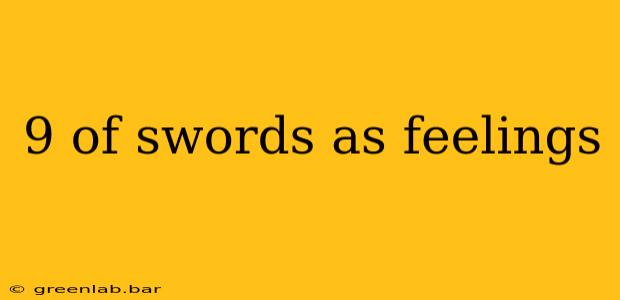The Nine of Swords is a card deeply associated with anxiety, worry, and sleepless nights. When it appears in a tarot reading focusing on feelings, it doesn't represent a fleeting moment of unease but rather a persistent, often debilitating, state of mind. Understanding its nuances can help you navigate these challenging emotions.
The Weight of Worry: Understanding the 9 of Swords' Emotional Landscape
The imagery of the Nine of Swords—a figure lying awake in bed, haunted by shadowy swords—perfectly captures the feeling of being overwhelmed by worry. This isn't just everyday stress; it's a deeper, more pervasive anxiety that can feel inescapable. The key emotional components associated with the Nine of Swords feelings include:
- Overthinking and Rumination: The card depicts a mind trapped in a cycle of negative thoughts. Details are magnified, potential problems are exaggerated, and solutions seem elusive. This leads to a sense of helplessness and despair.
- Guilt and Self-Recrimination: Often, the anxieties stem from past actions or perceived failures. The figure in the card is clearly plagued by self-criticism and regret, leading to feelings of intense guilt and self-blame.
- Fear and Apprehension: The future feels uncertain and threatening. The constant worry creates a state of fear, anticipating potential disasters and magnifying their impact.
- Insomnia and Restlessness: The inability to sleep is a common symptom of the emotional state represented by the Nine of Swords. The mind races, preventing rest and exacerbating the feelings of anxiety and distress.
- Paralysis and Inaction: Overwhelmed by anxiety, individuals may find themselves unable to take action. The weight of worry can be so heavy that even the simplest tasks seem insurmountable.
Distinguishing the 9 of Swords from Other Anxiety Cards
While many tarot cards touch upon anxiety, the Nine of Swords has a unique signature: it’s less about external stressors and more about internal turmoil. It's the difference between worrying about a looming deadline (which could be represented by other cards) and being consumed by self-doubt and past regrets long after the deadline has passed.
It's crucial to differentiate it from other cards representing negative emotions:
- The Three of Swords: Represents heartbreak and emotional pain from a specific event, rather than the persistent, self-inflicted anxiety of the Nine of Swords.
- The Five of Swords: Indicates conflict and defeat, focusing on external struggles rather than internal self-criticism.
- The Tower: Symbolizes sudden upheaval and unexpected crisis; the Nine of Swords is a slower burn, a gradual erosion of peace of mind.
Navigating the Emotional Weight: Coping Strategies
Experiencing the feelings associated with the Nine of Swords can be challenging, but several strategies can help:
- Cognitive Behavioral Therapy (CBT): CBT techniques are incredibly effective in addressing the negative thought patterns associated with anxiety. Learning to identify and challenge these thoughts can break the cycle of rumination.
- Mindfulness and Meditation: These practices help to bring awareness to the present moment, reducing the power of racing thoughts and worries about the past or future.
- Journaling: Writing down your worries can help to externalize them, making them less overwhelming and providing a space for self-reflection.
- Physical Activity: Exercise releases endorphins, which have mood-boosting effects, and can be a powerful tool in managing anxiety.
- Seeking Support: Talking to a trusted friend, family member, or therapist can provide valuable emotional support and guidance.
The Nine of Swords as feelings is a powerful message to acknowledge and address the underlying anxieties, guilt, and self-criticism. By understanding the card's significance and employing effective coping strategies, you can begin to navigate these emotions and find your way back to peace of mind. Remember, seeking professional help is a sign of strength, not weakness, when dealing with persistent anxiety.

